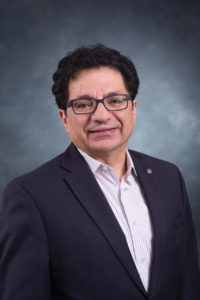Dr. Hossein S. Kazemi

Dr. Hossein S. Kazemi
Dr. Hossein S. Kazemi is a Professor of Economics at Stonehill College. He also teaches at Boston College and Harvard. He earned his MA and Ph.D. in Economics from Clark University. His research and publications are in monetary policy, exchange rates, financial markets, financial crisis, investment and business cycles, and economic pedagogy. Professor Kazemi’s more recent publications on teaching economics focus on how to teach macroeconomics and monetary policy in a more applied fashion using Bloomberg’s real-time data and analytics. His current research focuses on the dynamic effects of the Federal Reserve’s quantitative easing.
As an early recipient (1998) of “the Louise F. Hegarty Award For Excellence in Teaching,” Professor Kazemi teaches courses in Money & Banking, Monetary Policy, International Finance, Fixed Income Analysis, Impact of News on Financial Markets in addition to Micro and Macroeconomics. In 1997, he founded Bloomberg Program at Stonehill College, where he put together an entire curriculum that is based on Bloomberg, teaching students economics in a more applied and analytical fashion with real-time data and news.
Dr. Kazemi served as President and Chairman of the Board of BIC Nehemiah Partnership, a 501(c)(3) organization focusing on helping working-class families with their housing and related financial needs, from 2004 to 2015. In addition, as a Rotarian since 2015, he engages and is directly involved in a variety of community services and charitable activities. Since 1999, Dr. Kazemi has also served on the Board of Directors of Bank of Easton, where he also is the Chairman of the Audit and Finance Committee, as well as serving as a board member and the economist on the ALCO (asset/liability) Committee of the bank.
Why did you become a member of the International Atlantic Economic Society?
I joined IAES in the 1990s after meeting John and Kathy Virgo, two of the nicest people I have ever met in my life at an IAES conference in Rome! John’s loss in 2012 was very sad and hard to accept. However, his memory, his kindness, and his passion for IAES have given all of us, as his fans, a significant level of energy and enthusiasm to help carry his torch on his behalf. Since then, I have been actively involved with the IAES by organizing sessions at conferences as a member of the program committee, participating in sessions by presenting papers, chairing sessions, and serving on the Board of Editors of IAER. Over the years, through my involvement at IAES and participation at conferences in North America and Europe, I have met so many wonderful colleagues from all over the world. This has resulted in the forging of many strong friendships that I cherish immensely and forever.
What types of projects/research are you currently working on and what inspired/motivated you to pursue these interests?
My research and publications are in monetary policy, financial markets, financial crisis, investment & business cycles, and economic pedagogy. My more recent work and resulting publications on teaching economics focus on how to teach macroeconomics and monetary policy in a more applied fashion using Bloomberg’s real-time data and analytics. Two such projects are: “Teaching Courses in Macroeconomics and Monetary Policy with Bloomberg Analytics,” with Dean Croushore of Federal Reserve Bank of Philadelphia and the University of Richmond. This paper was published in The American Economic Association Journal of Economic Education, Volume 50, 2019, Issue 2. The second pedagogy paper was on “Using Bloomberg Real-time Data and Analytics to teach Economics and Finance,” and it was published in The Journal of Economics and Financial Education, Volume 14, No. 1, Summer 2015. My current research focuses on “the dynamic effects of the Federal Reserve’s quantitative easing in the US and Eurozone.”
What advice would you give to someone who is considering entering your line of work/field of study?
I find teaching the most rewarding job and my field of study, i.e., macroeconomics and monetary policy, the most interesting and exciting areas in economics for me. So, the advice I give them is once you have figured that economics is what you love as a field, enter academia if teaching and research is your passion. If not, there are plenty of fascinating career possibilities in both the private and public sectors that provide very gratifying, financially and professionally, lines of work for people with training in economics.
Going forward, what other projects/research are you planning to or hoping to pursue?
I would like to expand on a paper that my colleague Ayla Ogus Binatli and I presented a few years back at one of the IAES conferences in Munich, Germany, titled: “the effect of monetary policy on real exchange rate misalignment.”
What’s your favorite hobby?
I don’t have a single hobby as I have many interests and have a tough time choosing any single one over the others. However, the following are my top hobbies: photography, mountain biking, cooking, and gardening. As a passionate photographer today, I started photography before the age of 10 and followed my passion through the years using film. While in college, I sustained my expensive hobby by taking photos at weddings and other functions, earning an income to buy more lenses and photography equipment. As I began raising my own family, I used my photography skills to take pictures of my kids at their soccer games or swim meets, along with pictures of their teammates. This made me the de facto team photographer in any sport that my kids were engaged in. Today, I utilize my photo gear and photography skills and volunteer to photograph charity and fundraising functions and events.

